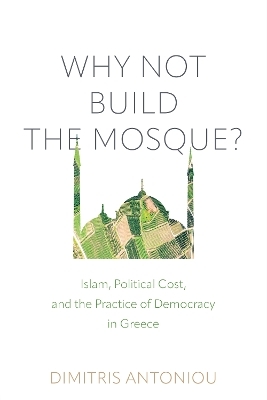
Why Not Build the Mosque?
Islam, Political Cost, and the Practice of Democracy in Greece
Seiten
2025
University of Pennsylvania Press (Verlag)
978-1-5128-2717-0 (ISBN)
University of Pennsylvania Press (Verlag)
978-1-5128-2717-0 (ISBN)
- Noch nicht erschienen (ca. März 2025)
- Versandkostenfrei innerhalb Deutschlands
- Auch auf Rechnung
- Verfügbarkeit in der Filiale vor Ort prüfen
- Artikel merken
An ethnography of a long-unbuilt mosque in Greece that explores government operations and contemporary democracy
Why Not Build the Mosque? tells the story of the Greek state’s centuries-long attempt to build a central mosque. After the fall of Ottoman Empire, Greek Orthodoxy entwined with Greek nationalism, and by the twentieth century, the state came to imagine Islam as incompatible with a Greek-speaking Orthodox Christian identity. And so as late as 2020, the contemporary Greek state did not have a mosque, even as its Islamic population grew and increasingly required a place of worship.
Focusing on the failed effort in the early 2000s to build a mosque in a suburb of Athens and on the subsequent, successful realization of the project in 2020, Dimitris Antoniou investigates the roles that the Orthodox Church, politicians concerned about the “political cost” of supporting a mosque, and the community played in the project’s delays, failures, and its bittersweet success. The mosque that was ultimately built in 2020 was itself a compromise, a modest building that failed to deliver on the dreamed-of and finally illusory building discussed in the 2000s.
As Antoniou brings readers from under-the-radar home mosques to the offices of polling companies, politicians, and media corporations, he reveals that the years-long debate over if, how, and where to build a mosque wasa matter greater than religion or nationalism alone. Indeed, the story of the central mosque in Athens compellingly demonstrates how productive unrealized plans can be for some stakeholders—here politicians and members of media who built reputations on their support for or opposition to the unbuilt mosque—while leaving other stakeholders unable to move a project forward even when the will of the majority is with them. Ultimately, Why Not Build the Mosque? sheds light on what it takes for a government to make tangible changes—to infrastructure, in development, for a community—happen in contemporary democracies.
Why Not Build the Mosque? tells the story of the Greek state’s centuries-long attempt to build a central mosque. After the fall of Ottoman Empire, Greek Orthodoxy entwined with Greek nationalism, and by the twentieth century, the state came to imagine Islam as incompatible with a Greek-speaking Orthodox Christian identity. And so as late as 2020, the contemporary Greek state did not have a mosque, even as its Islamic population grew and increasingly required a place of worship.
Focusing on the failed effort in the early 2000s to build a mosque in a suburb of Athens and on the subsequent, successful realization of the project in 2020, Dimitris Antoniou investigates the roles that the Orthodox Church, politicians concerned about the “political cost” of supporting a mosque, and the community played in the project’s delays, failures, and its bittersweet success. The mosque that was ultimately built in 2020 was itself a compromise, a modest building that failed to deliver on the dreamed-of and finally illusory building discussed in the 2000s.
As Antoniou brings readers from under-the-radar home mosques to the offices of polling companies, politicians, and media corporations, he reveals that the years-long debate over if, how, and where to build a mosque wasa matter greater than religion or nationalism alone. Indeed, the story of the central mosque in Athens compellingly demonstrates how productive unrealized plans can be for some stakeholders—here politicians and members of media who built reputations on their support for or opposition to the unbuilt mosque—while leaving other stakeholders unable to move a project forward even when the will of the majority is with them. Ultimately, Why Not Build the Mosque? sheds light on what it takes for a government to make tangible changes—to infrastructure, in development, for a community—happen in contemporary democracies.
Dimitris Antoniou is Lecturer in the Hellenic Studies and Classics Department and Associate Director of the Stavros Niarchos Foundation Public Humanities Initiative at Columbia University.
| Erscheint lt. Verlag | 4.3.2025 |
|---|---|
| Reihe/Serie | Contemporary Ethnography |
| Zusatzinfo | 25 b&w images, 2 figures |
| Verlagsort | Pennsylvania |
| Sprache | englisch |
| Maße | 152 x 229 mm |
| Themenwelt | Geisteswissenschaften ► Geschichte ► Regional- / Ländergeschichte |
| Geisteswissenschaften ► Religion / Theologie | |
| Sozialwissenschaften ► Ethnologie | |
| Sozialwissenschaften ► Politik / Verwaltung ► Politische Systeme | |
| Sozialwissenschaften ► Soziologie ► Spezielle Soziologien | |
| ISBN-10 | 1-5128-2717-7 / 1512827177 |
| ISBN-13 | 978-1-5128-2717-0 / 9781512827170 |
| Zustand | Neuware |
| Haben Sie eine Frage zum Produkt? |
Mehr entdecken
aus dem Bereich
aus dem Bereich
Universalgelehrter, Polarreisender, Entdecker
Buch | Hardcover (2024)
mareverlag
28,00 €


